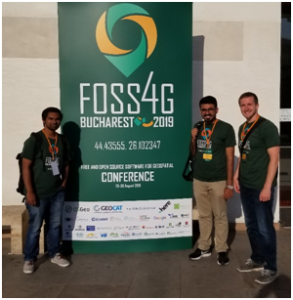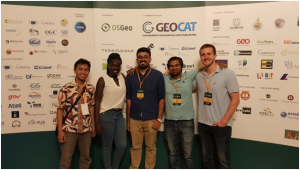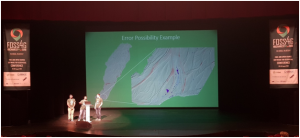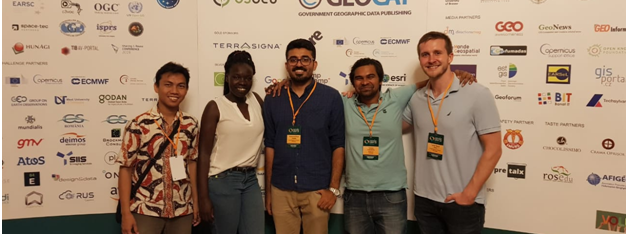Participation at FOSS4G, Bucharest (Romania), August 2019
Oct 01
- posted by Geotech Master
- in Sin categoría
- 0 Comments
Five students of the Erasmus Mundus Master of Geospatial Technologies got to participate in the 2019 Free and Open Source Software for Geospatial (FOSS4G) conference in Bucharest, Romania. Muhammad Hasan Mustafa, Tanmoy Chakraborty, and Jordan Bates gave a talk on a plugin, “Three-D Change Detection: A QGIS Plugin with Python 3”, they developed for QGIS, Ismail Sunni participated in the conference hackathon where he continued to contribute to QGIS’s new 3D viewer, and Brenda Ayo was awarded a travel grant to participate.
The opportunity to give the talk on the plugin was the result of a community vote on abstract and topic submissions. The plugin focused on the analysis of digital elevation models (DEM) collected of the same area but temporally different. The analysis between two temporally different DEMs, Digital Terrain Models (DTMs) or Digital Surface Models (DSMs) can indicate important factors such as erosion, structural damage, or deforestation. The plugin automated the steps within QGIS to process and display these changes within a 3D environment. In addition, it introduced a relatively new way of assessing possible errors within in DEMs generated from Unmanned Aircraft System (UAS) optical imagery processed using photogrammetry. This allows the user to access the accuracy of the results of their analysis. The abstract for the talk can be found here: https://talks.2019.foss4g.org/bucharest/talk/3WTHJE/
The video for the talk can be found here: https://media.ccc.de/v/bucharest-165-three-d-change-detection-a-qgis-plugin-with-python-3
The plugin has been published to the QGIS repository with the title of “Three-D Change Detection” and can be publicly downloaded for use. It can be found within the QGIS software with the plugin manager or on the repository webpage here:
https://plugins.qgis.org/plugins/Three_D_Change_Detection-master/

Participants in front of the theater before presenting on their plugin

From left to right, Ismail Sunni, Brenda Ayo, Muhammad Hasan Mustafa, Tanmoy Chakraborty and Jordan Bates

Muhammad Hasan Mustafa (left), Tanmoy Chakraborty (center), Jordan Bates (right) on the stage of the National Theater in Bucharest, Romania
